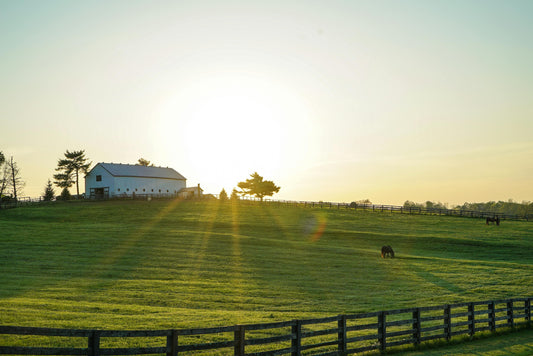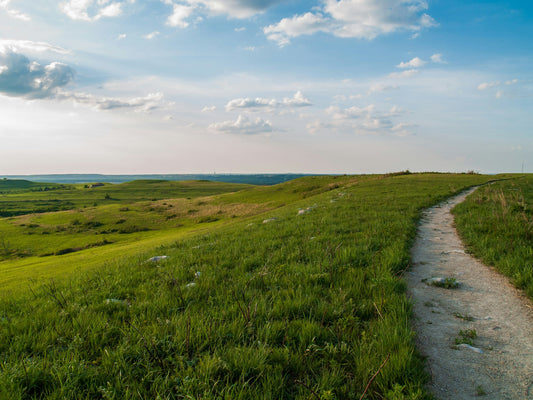The Legality of Hemp in Alaska: A Complete Guide
Over the past few years, interest in hemp and hemp-derived products has exploded, driven by a changing cannabis–minded population and policies and new advocacy for both federal and state legislation.
The significance of the 2018 Farm Bill as a turning point for the hemp industry across the U.S. is that it laid out a framework for how it could distinguish hemp from marijuana, but states like Alaska have added their requirements.
Hemp products in Alaska and their derivatives also have strict guidelines, particularly with regard to THC levels and product endorsement. Producing, retail, and even consumers can find these state-specific regulations to be very difficult. They might end up asking, is Delta 9 Legal in Alaska?
In this guide we are going to go into depth covering what's currently legal for Alaska when it comes to hemp and its derivatives. This runs the gamut from state law definitions of what counts as "hemp" to the bounty of product-specific regulations and research on what you need to do to comply.
Definitions and Distinctions: Understanding Hemp
What is Hemp?
Hemp varieties of the Cannabis sativa plant contain less than 0.3 percent THC on a dry weight basis. This is an extremely important threshold, as it legally safeguards hemp from marijuana in both federal and state law.
Hemp is defined in the same way as it is federally defined in the 2018 Farm Bill, in Alaska Stat. § 03.05.100, except in Alaska. This statute says that all parts of the cannabis plant and its derivatives are hemp, so long as they do not contain more than 0.3% Delta-9 THC.
Hemp plants have been around since the dawn of time, the only thing you can do with them is make everything from textiles to food products to supplements. Still, hemp has a low THC content; its legal status has been as changeable as it unites it with marijuana.
However, the 2018 Farm Bill and subsequent regulations from the Alaska Department of Agriculture permitted Alaska to create a unique legal structure for hemp, that is the legal production of hemp, processing, and sale of hemp, as long as it meets specific strict rules.
Why the 0.3% Delta-9 THC Limit Matters in Alaska?
When we answer, “Is Delta 9 Legal in Alaska?” it goes like this: Hemp's legality is tied to this 0.3% threshold in Alaska's hemp regulations. If these products contain more than this limit, they are considered to be marijuana. They are regulated by the state's controlled substances laws, which greatly restrict movement from owners to consumers.
For businesses in the wellness and recreational markets, exceeding the THC threshold can lead to product recalls, fines, and even criminal charges, which is why the THC threshold is so important.
The 0.3% limit ensures consumers some protection against the psychoactive effects one will experience from higher levels of THC in hemp-derived products. At the same time, this limit also guarantees that hemp stays legal and accessible for Alaskan consumers to enjoy its many uses.
Major Milestones in Alaska’s Hemp Laws History
Pre-2018 Regulations
For years before 2018, Alaska's stance on hemp was restrictive. The state treated it essentially like marijuana because the state regarded hemp as basically a type of cannabis that was in a slightly different family.
Like other states, Alaska placed all cannabis products, including hemp, in a class of controlled substances. Such restrictions limited the growth as well as dealing of hemp even though the hemp had little THC.
At this point, before 2018, farmers and businesses, as a rule, couldn't develop or sell hemp products. Hemp was viewed mostly as a niche crop, often in the shadow of being legal and culturally stigmatized marijuana.
Thus, the hemp industry’s development stopped at a point where consumers have very limited access to all the varieties of hemp products, such as textiles, food, and supplements.
Farm Bill 2018 and Its Impact on Alaska
A seminal piece of legislation, that removed hemp from marijuana at the federal level, was the 2018 Farm Bill.
The Farm Bill defined hemp as Cannabis sativa with a Delta 9 THC concentration of not more than 0.3%, introducing the legal growth, processing, and sale of the plant under federal law.
This allowed states to enact their regulatory framework around hemp, which Alaska did in line with these federal rules.
For Alaska, the Farm Bill was no different.
Although the state produced its own hemp license rules, product endorsement rules, and big compliance standards, all hovered around the federal 0.3% Delta-9 THC threshold when it comes to clearing out, is Delta 9 legal in Alaska?
Passage of the Farm Bill allowed Alaska to create a unique, regulated hemp industry while keeping some state-level controls in place to guarantee compliance.
Recent Legislation on Hemp Products
After the Farm Bill was passed, Alaska implemented specific regulations governing the sale and production of hemp products. One of the most significant changes was the state's endorsement requirement, which mandates that all hemp-derived CBD products must be endorsed by Alaska's Department of Natural Resources: Division of Agriculture.
Endorsed by Alaska, this process ensures only products without Delta-9 THC or synthetic cannabinoids meet Alaska's rigid standard of purity and safety.
An endorsement requirement is an integral part of Alaska's regulatory scheme because it provides an additional quality check on hemp products beyond simple THC testing.
Besides THC compliance, endorsed products must also fulfill labeling and packaging requirements, including the labeling need to specify ingredients, product weight, and dosage information.
To provide a legal market for safe and compliant hemp products and protect consumers, the approach is a comprehensive one.
Hemp Grower Licensing Requirements in Alaska
Again, those wanting to enter Alaska's hemp industry as growers will need to get a license. The licensing process also involves application submission, background check, and application fees.
After gaining their licenses, growers are required to submit their plants to Alaska's required preharvest THC testing prior to harvesting and processing the plants so they know all of their hemp plants produced no more than 0.3 percent THC.
Alaska's approach to licensing and pre-harvest testing is aimed at keeping noncompliant hemp out of the market. Along the way, the state does random checks to make sure that licensed growers are keeping up with their state's requirements.
Knowing and implementing these requirements is vital for growers because of the severe consequences: fines, license suspension, and even more.
Compliance Procedures for Hemp Businesses
Along with growing, Alaskan hemp businesses also have to comply with stringent compliance procedures. Regular THC testing is one of the most critical aspects of compliance on the manufacturing side because THC testing verifies that all products are within the legal THC threshold.
Businesses will, in addition to testing the product, have to maintain detailed records and make sure product labeling is correct, as well as product ingredient lists, recommended dosages, and batch numbers are all present.
Businesses selling hemp-derived CBD products must also seek an endorsement from the Department of Natural Resources: Division of Agriculture. The process by which a product is endorsed involves a review to make sure the product meets Alaska's standards for purity and label.
As a result, Alaskan hemp businesses should take compliance very seriously, as non-compliance with these requirements can lead to enforcement actions such as product recalls or penalties.
The Implications of Non-Compliance
When you are trying to uderstand “Is Delta 9 Legal in Alaska?” the violations of Alaska's hemp regulations are severe. In the case of businesses, consequences may be, among other things, fines, license suspension, or product recalls commanded by the company.
Because of this, in cases in which products contain more than the permitted 0.3 percent THC, businesses or individuals selling or possessing the product could be charged with a crime as, under Alaska law, the product would be considered controlled.
Noncompliant products may also present a safety risk to consumers if those products contain synthetic cannabinoids or THC levels above the expected level.
Businesses have to monitor their products and their compliance carefully and must comply with Alaska's endorsement and testing requirements to avoid such penalties and keep track of any regulatory changes.
Certain Product-Specific Restrictions In Alaska
Edibles, Flours, Topicals, CBD Products
Alaska has strict regulations on topicals, edibles, and products with CBD from hemp. These products cannot contain synthetic cannabinoids like Delta-8 or HHC that are found in other states and can not contain Delta-9 THC.
Additionally, all CBD products must be endorsed by the Department of Natural Resources. It is very important that the Division of Agriculture assures they stay at Alaska's high purity and compliance standards.
This endorsement obligates manufacturers to indicate a variety of other details, such as the product's name, quantity serving size, and ingredients list.
When we answer the query, “Is Delta 9 Legal in Alaska?” remember that claims of any health or medical nature are not allowed (i.e., no health benefit claims included when advertising a product). These curbs aim to shield clients and to make sure the product's substance is clear and correct.
Regulations About Delta-8 THC and HHC
While both Delta 8 THC and HHC remain popular in other states, they are illegal in Alaska. In simple words, these are cannabinoids that go out of Alaska's definition of a naturally occurring cannabinoid.
This also means that since both Delta 8 THC and HHC products are THC products, they are not allowed for sale in the state. Alaska's conservatism on hemp derivatives created through chemicals is carried through in the restriction on Delta-8 and HHC.
Delta-8 THC and HHC are otherwise two different cannabinoids compared to Delta-9 THC, naturally found in the cannabis plant. They are usually formed by altering another cannabinoid here, which also raises regulatory and safety issues related to them.
Because of this ban, legal hemp products can contain only naturally occurring cannabinoids.
Regulations About THCA Flower
Also restricted in Alaska are hemp products that contain THCA flower, another form of hemp that's become popular in other states. THCA is a non-psychoactive precursor to THC. THCA doesn't get you high in its uncooked form; however, when heated, it changes into THC, which can exceed the 0.3% legal limit.
Alaska banned THCA flower because it could contain more THC than legally allowed, depending on how it's smoked or otherwise consumed, converting THCA to THC. Alaska restricts THCA flowers to limit the chance that products may unknowingly contain prohibited levels of THC.









